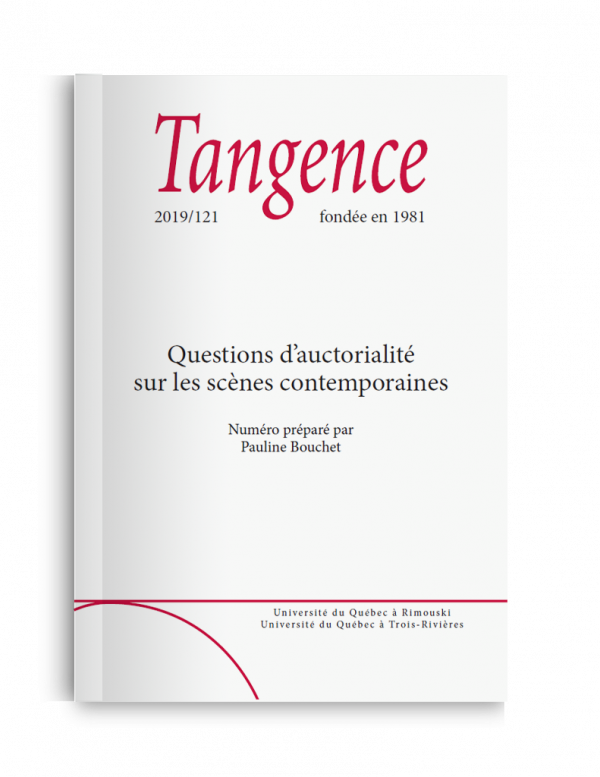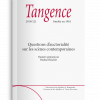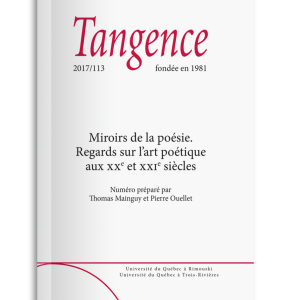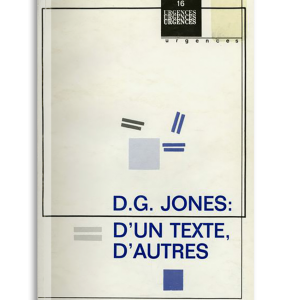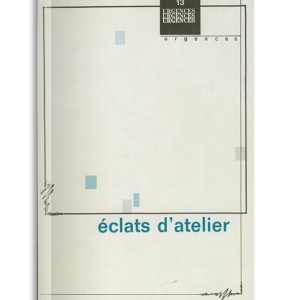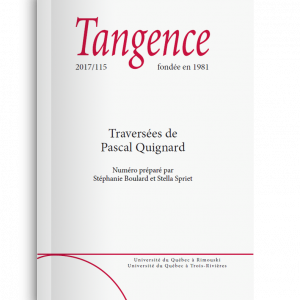Theatrical editorialization : a project from GRIET XIX-XXI
Benoît Barut, Catherine Brun, Élisabeth Le Corre
Because theatre is necessarily a collective art to some degree, its editorialization must be considered in the plural. The passage from text to stage, when it exists, calls for a collaborative editorial workflow : producer, actors, decorators, costumers, technicians, lighting specialists, sound engineers and spectators, sometimes, enter into the creative dance. Furthermore, each of the theatre “times”—that of one’s own or others’ (re)writing on the page or the stage ; that of creation ; that of theatrical or editorial distribution—sometimes involves several authors for one and the same signatory and for a same creation. To define this editorial diversity, the members of GRIET have introduced structures and trends examined here through the prism of two opposing movements : one resembling an overpowering authority coming from above, but upset ; and the other in the form of a horizontal cooperation, from which a dominant figure often emerges.
The conditions and practices of playwriting in France
Antoine Doré
French playwrights benefit from the world’s oldest copyright legislation, which ensures them strong moral rights and allows them to receive compensation for the performance or publication of their texts. However, their specific method of remuneration, copyright, is structurally weak and irregular. Playwrights must as a result be versatile and diversify their activities, some within the sphere of creative writing, others within the theatre and still others outside the arts field. Three key models of writing, corresponding to distinct modes of remuneration, legitimization and relation to stage production, can be identified : “commissioners”, “writer-producers” and “authors of open source projects.”
The producer and the others, or the difficulty of collaborative editorialization in the French public theatre
Bérénice Hamidi-Kim
This article aims to highlight both the causes and consequences of a paradox characteristic of the world of live performance subsidized in France : whereas a particular feature of stage productions, in comparison with other forms of expressions of the art, is reliance on the collective work of a broad diversity of artistic and technical professions, recognition, both symbolic and economic, is essentially captured by the figure, often individual, of the producer. This capturing process is mainly achieved when the figure of the producer is transformed into the author of the performance.
Contemporary English playwrights’ testing of collaborative practices
Séverine Ruset
Although the figure of the author remains retains significant authority in contemporary English theatre, which traditionally accords a place of choice to new dramatic writing, it has been undermined since the early 21st century by a notable increase in collaborative practices. Founded on an analysis of playwrights’ discourses regarding their role (as it falls to them, but also as they lay claim to it), this article examines how these evolutions affect the status of authors within the English theatre world or, more precisely, the recognition and valorization system they belong to and whose outlines they help reshape through their positions. It focuses, notably, on the development of a collaborative stance that is particularly evident in the will expressed by a growing number of authors not to relinquish their authority, but to share it a bit more, at least, with both their artistic collaborators and the spectators.
Sharing editorialization with the spectator in contemporary Quebec theatre in the digital age
Hervé Guay
This examination of shared editorialization with the spectator as regards the performance arts in the digital age is based on two Quebec productions : Le 6e salon international du théâtre contemporain (2005) and Pôle Sud (2016). By examining the attribution of the signature in the paratext, the presence or absence on stage of the show’s possible authors, the material and relational space that shapes the exchanges and the aesthetic and ethical implications of the editorial configuration, the issue is to draw attention to certain changes evident in the distribution of authority within contemporary Quebec theatre in terms of both creative process and performance.
Shared editorialization : the reappropriation of pop culture in Olivier Choinière and the Wooster Group
Maude B. Lafrance
This article examines how Olivier Choinière (Québec) and the Wooster Group (United States) make use of pop culture in their staged performances to produce singular assemblies, their stance as creators shifting to that of designers of miscellaneous cultural objects. The notion of editorialization blurs, for it is trapped between the action of establishing the scenic work and that of referring to the multiplication of pop culture references—which itself adversely affects the attribution to a single author. Their stance then resembles that of the prosumer, combining the production and reception of aesthetic objects. As a result, the originality and authenticity of their creative voices are detected in the movement of selection and restructuring.
From artist to author : the process of legitimizing the circus as a creative art in France
Marion Guyez
This article aims to study the notion of author within the French circus context of the 2010 decade, where it remains controversial and vague despite its increasingly common use. The issue, notably, is to understand how, in a movement of attraction and repulsion regarding literary and dramatic models, the identification and recognition of the editorialization of the scenic forms of this body art help reinforce the legitimacy of the circus as an art of creation and not merely an art of entertainment. After studying the visual, sensory and physical dimensions of circus writings close to the aesthetics of post-dramatic portrayals, we describe the forms of writings (dossiers, notes, sketches, traces, etc.) produced by the circus workers.

